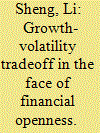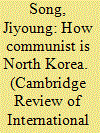| Srl | Item |
| 1 |
ID:
101340


|
|
|
|
|
| Publication |
2010.
|
| Summary/Abstract |
This paper analyses optimal tradeoffs between economic growth and economic volatility given the risk of open capital markets in developing countries due to their financial vulnerability to unfettered capital flows. It is argued that free policy choices are efficiently superior to free capital mobility and that a developing country can be open to higher growth and lower volatility only if its financial system is substantially strengthened.
|
|
|
|
|
|
|
|
|
|
|
|
|
|
|
|
| 2 |
ID:
101338


|
|
|
|
|
| Publication |
2010.
|
| Summary/Abstract |
This article focuses on the Marxist characteristics of North Korea in its interpretation of human rights. The author's main argument is that many Marxist features pre-existed in Korea. Complying with Marxist orthodoxy, North Korea is fundamentally hostile to the notion of human rights in capitalist society, which existed in the pre-modern Donghak (Eastern Learning) ideology. Rights are strictly contingent upon one's class status in North Korea. However, the peasants' rebellion in pre-modern Korea was based on class consciousness against the ruling class. The supremacy of collective interests sees individual claims for human rights as selfish egoism, which was prevalent in Confucian ethics. The prioritization of subsistence rights and material welfare over civil and political rights was also the foremost important duty of the benevolent Confucian king. Finally, unlike Marx's reluctant use of the language of 'duties', rights are the offspring of citizens' duties in North Korean human rights discourse.
|
|
|
|
|
|
|
|
|
|
|
|
|
|
|
|
| 3 |
ID:
101339


|
|
|
|
|
| Publication |
2010.
|
| Summary/Abstract |
The issues of gender-related persecution and violence against women have been put onto the international agenda, largely thanks to lobbying by feminist NGOs and transnational networks. There is a question, however, of how successfully this agenda-setting has translated into effective policy-making and policies that will increase the protection of women who are victims of gender-related persecution. One of the problems with policies to support women refugees and asylum seekers lies in a failure of transmission of the goals of gender sensitivity through all the various bureaux and representatives of a large bureaucratic organization such as the United Nations High Commissioner for Refugees (UNHCR). For nearly twenty years, since the early 1990s, the UNHCR has identified 'refugee women' as a policy priority, and yet, despite this prioritization of concerns about women refugees and gender issues in the asylum and refugee process, it could be argued that little progress has been made in implementation of policies on refugee women. This article will examine the way in which the concept of gender has been adopted within the UNHCR and the processes that have been put in place to mainstream gender within refugee protection activities. How far has mainstreaming managed to move policies to protect women beyond a mere focus on 'vulnerable' groups, and to integrate a gendered understanding of the global processes that produce refugees, and of the protection needs of these refugees?
|
|
|
|
|
|
|
|
|
|
|
|
|
|
|
|
| 4 |
ID:
101337


|
|
|
|
|
| Publication |
2010.
|
| Summary/Abstract |
This paper discusses the meaning of 'the West' in Chinese and Japanese political discourse. It argues that for Japanese and Chinese political thinkers, the West does not exist in the West. Rather, the West is sometimes at the periphery and, at other times, at the centre. For them, 'the Chinese' is about the epistemology of all-under-heaven. There is no such concept as 'Other' in this epistemology. As a result, modern Western thinkers depend on opposing the concrete, historical, yet backward Other to pretend to be universal, while Chinese and Japanese thinkers concentrate on self-rectification to compete for the best representative of 'the Chinese' in world politics. 'The Chinese' is no more than an epistemological frame that divides the world into the centre and the periphery. In modern times, the Japanese have accepted Japan as being at the periphery of world politics, while the West is at the centre. To practise self-rectification is to simulate the West. The West is therefore not the geographical West, but at the centre of Japanese selfhood. Self-knowledge produced through Othering and that through self-rectification are so different that the universal West could not make sense of the all-under-heaven way of conceptualizing the West.
|
|
|
|
|
|
|
|
|
|
|
|
|
|
|
|